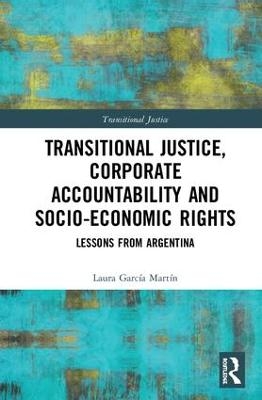
Transitional Justice, Corporate Accountability and Socio-Economic Rights
Routledge (Verlag)
978-0-367-20414-3 (ISBN)
While both have received significant academic and political attention, the potential links between them remain largely unexplored. This book addresses the normative question of how international human rights law should deal with corporate accountability and violations of economic, social and cultural rights in transitional justice processes. Drawing on the Argentinian transitional justice process, the book outlines the theoretical and practical challenges of including corporate accountability in transitional justice processes through existing mechanisms. Offering specific insights about how to deal with those challenges, it argues that consideration of the role of all actors, and the whole spectrum of human rights violated, is crucial to properly address the root causes of violence and conflict as well as to contribute to a sustainable and positive peace.
This interdisciplinary book will be of interest to students and scholars of transitional justice, human rights law, corporate law and international law.
Laura García Martín is a postdoctoral researcher and teaching assistant at University of Seville and University of Antwerp. Her research interests include the socio-economic dimension of transitional justice and business and human rights.
Book Abstract
List of Abbreviations
Acknowledgments
Introduction
PART I – TRANSITIONAL JUSTICE AND SOCIO-ECONOMIC RIGHTS
Chapter 1 - Analysing the Transitional Justice paradigm
Introduction
Background and evolution of Transitional Justice
Defining the Transitional Justice Paradigm
Transitional Justice Processes and Mechanisms
Truth
Justice
Reparations
Institutional Reform
Transitional Justice Theories
Socio-political aspects of Transitional Justice
Intermediate conclusions: A unique model of transitional justice?
Chapter 2 – Socio-economic Rights in Transitional Justice
Introduction
Contextualising socio-economic rights in International law
Labour rights as socio-economic rights: a particular focus on freedom of association at the workplace
Labour rights as human rights
Freedom of association at the workplace: the right to form and join trade unions and the right to collective bargain
Traditional invisibility of socio-economic rights in transitional justice contexts
Addressing socio-economic rights in transitional justice processes
Truth and reconciliation commissions
Judicial Processes
Reparations policies
Institutional reform
Intermediate conclusions: the added value of addressing socio-economic rights in transitional justice
PART II: CORPORATE ACCOUNTABILITY IN TRANSITIONAL JUSTICE
Chapter 3 – Corporate legal accountability for human rights abuses
Introduction
Clarifying the notion of corporate complicity for human rights abuses
Policy meaning and legal implications
Categories of corporate complicity
Direct corporate complicity
Indirect complicity
Silent complicity
Corporate accountability under the existing legal regimes
International and domestic criminal law
Corporate criminal responsibility
Accomplice liability under domestic criminal law
Enforcement mechanisms and practical obstacles
Civil law of remedies
Elements of legal liability
Causation and complicity
Allocating liability within corporate groupsSpecial mention to the Alien Tort Statute
Enforcement mechanisms and practical obstacles
International human rights law
Background and recent developments
The UN Guiding Principles on Business and Human Rights
Pillar I: the State’s duty to protect
Pillar II: the corporate responsibility to respect
Pillar III: the right of access to remedy
Enforcement mechanisms and practical obstacles
Intermediate conclusions: the challenging task of holding corporations legally accountable for human rights abuses
Chapter 4 – Linking corporate accountability and transitional justice
Introduction
Engaging corporations in peacebuilding strategies
Challenges for the international framework of business and human rights in transitional justice
Addressing corporate accountability and socio-economic rights in transitional justice
Truth process
Justice process
Reparation process
Institutional reform process
Intermediate conclusions: The need to address corporate accountability in transitional justice
PART III – A CASE STUDY: ARGENTINA
Chapter 5 - Proceso de Reorganización Nacional: the dark ages of Argentinian history (1976-1983)
Introduction
International and national background
Coup and establishment of military juntas
Military juntas
Economic policy and social repression
Civilian involvement: a special focus on corporations and economic groups
Workers as a target of repression
The extended notion of ‘subversion’
Suppression of workers’ rights and trade unions intervention
Human rights violations
Intermediate conclusions: business involvement in human rights violations
Chapter 6 - Nunca Más: The transitional justice process in Argentina
Introduction
Political stages of the transitional justice process in Argentina
First period- new democratic governments and first accountability initiatives (1983-1989)
Second period - amnesty and pardons (1989-2003)
Third period – new accountability era (2003-2015)
Current stage and challenges
Transitional justice mechanisms and accountability for socio-economic rights
Truth
Argentina’s truth commission: CONADEP
Truth trials
Justice
Domestic trials
Lawsuits in foreign courts
Reparations
Institutional Reform
Corporate accountability and the transitional justice process in Argentina
Intermediate conclusions: Argentina’s transitional justice approach to corporate accountability and socio-economic rights
Conclusions
Bibliography
Annex – List of interviews
Index
| Erscheinungsdatum | 08.08.2019 |
|---|---|
| Reihe/Serie | Transitional Justice |
| Verlagsort | London |
| Sprache | englisch |
| Maße | 156 x 234 mm |
| Gewicht | 453 g |
| Themenwelt | Recht / Steuern ► EU / Internationales Recht |
| Recht / Steuern ► Öffentliches Recht ► Völkerrecht | |
| Sozialwissenschaften ► Ethnologie | |
| Sozialwissenschaften ► Politik / Verwaltung ► Europäische / Internationale Politik | |
| Sozialwissenschaften ► Soziologie ► Spezielle Soziologien | |
| Wirtschaft ► Betriebswirtschaft / Management ► Marketing / Vertrieb | |
| Wirtschaft ► Volkswirtschaftslehre | |
| ISBN-10 | 0-367-20414-2 / 0367204142 |
| ISBN-13 | 978-0-367-20414-3 / 9780367204143 |
| Zustand | Neuware |
| Informationen gemäß Produktsicherheitsverordnung (GPSR) | |
| Haben Sie eine Frage zum Produkt? |
aus dem Bereich


